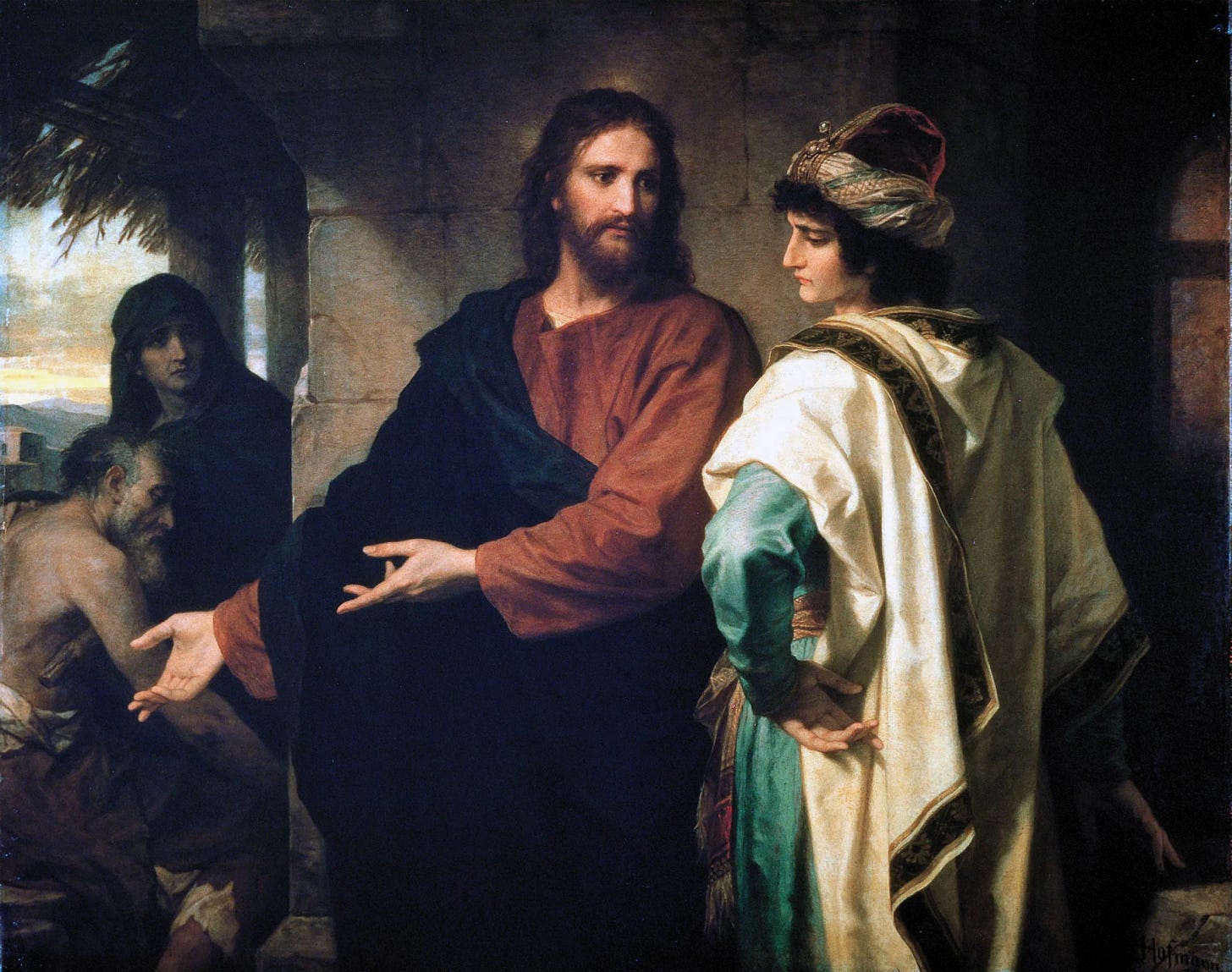And behold, a certain man came to him and said, ‘Good Master, what good work shall I do to have eternal life?’ He answered him, ‘Why dost thou ask me about what is good? One there is who is good, and he is God. But if thou wilt enter into life, keep the commandments.’ He asked him, ‘Which?’ And Jesus said,
Thou shalt not kill.
Thou shalt not commit adultery.
Thou shalt not steal.
Thou shalt not bear false witness.
Honor thy father and mother. And love thy neighbor as thyself.
The young man said to him, ‘All these I have kept; what is yet wanting to me?’ Jesus said to him, ‘If thou wilt be perfect, go, sell what thou hast, and give to the poor, and thou shalt have treasure in heaven; and come, follow me.’ But when the young man heard the saying, he went away sad, for he had great possession. (Mt 19: 16-22 NCE)
This Gospel reading from Matthew sets the stage for one of the most popular Gospel passages about the rich man and the eye of the needle. Yet, there are gems of wisdom in this passage that are theologically integral when considering the fullness of meaning within Christ’s teachings. However, many, when exegeting, tend to focus on only the overt commands of Christ instead of seeing a greater meaning within a finely woven fabric. For instance, some may consider that Christ is equating wealth or possessions as evil in themselves, and yet both Job and Abraham were wealthy. Additionally, some may even attack the idea of “good works,” since nothing is “good” except God. But Christ’s command to help the poor is certainly a good work, so there must be more to be considered here.
First, Christ is reminding all of us that all works merely from ourselves alone cannot merit the kingdom of God. Jesus is trying to establish the idea here that there is an actual source of all goodness—that goodness itself, is of and from God. So, when we indeed are helping the poor or sick with our alms and our time, we are cooperating with and participating in the good grace of God and meriting only through the merits of Christ, our risen Lord. This rich young man was indeed lucky to have the Son of Man Himself show him the way to eternal life, and He does so in two ways. Certainly, Christ wants us all to keep the commandments, which are basically the embodiment of the natural law, which has its ends in the eternal, each law considering the internal virtue of oneself in relation to others, all falling under Christs command to “Love thy neighbor as thyself.” Following these commandments of Christ is His first invitation to the rich man.
However, the rich man was already following these laws, and petitioned Christ for even more. Christ’s ministry, as we know, was distinctly involved with helping all types of the less fortunate. Christ’s true disciples left the lives they once knew to follow Christ, which also involved detaching themselves of their wealth and giving it to the poor. By saying yes to following Jesus, His disciples were thus able to attain a greater level of spiritual perfection—even beyond the law. So, this invitation to the rich young man was to show him what His disciples had done, to become vulnerable—poor in a worldly sense—but enriched and sustained by their faith and trust in Christ. Although the man was disappointed, it didn’t mean however, that he couldn’t be saved. Christ knew the difficulty of attachment to earthly things, and He also knew that not everyone was going to be on the same level as His twelve disciples, but this Gospel passage should, at the very least, increase awareness in all of us when weighing our attachment to wealth against our eternal salvation. But, as was said earlier, wealth isn’t inherently evil in itself; in fact, a wealthy person may very well be better able to help and serve the poor in perpetuity because of their wealth. So, in this case, it’s really how one decides to use it, and we all know that Christ can use any situation for the good! And although Christs invitation in its most literal sense would surely be welcomed, it is not what many have the spiritual capacity to accommodate. However, it does make one think… “Being perfect,” as Christ explains in this Gospel, so to positively secure one’s eternal salvation, is still a most generous offer from our dear Lord.



Indeed, AMEN!!!!!!!!!